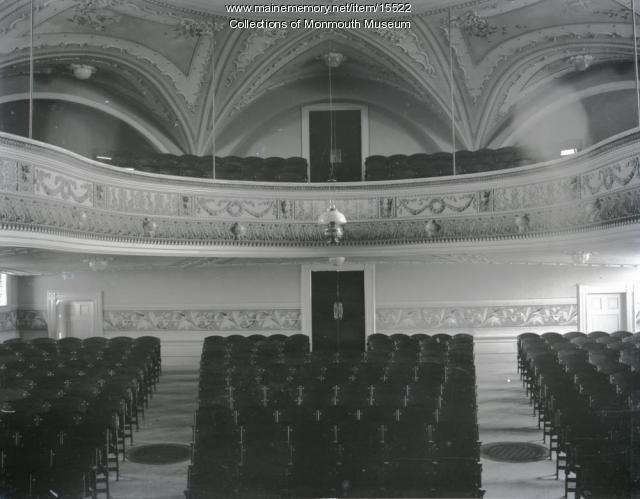Keywords: French family
- Historical Items (105)
- Tax Records (12)
- Architecture & Landscape (0)
- Online Exhibits (66)
- Site Pages (71)
- My Maine Stories (53)
- Lesson Plans (1)
Online Exhibits
Your results include these online exhibits. You also can view all of the site's exhibits, view a timeline of selected events in Maine History, and learn how to create your own exhibit. See featured exhibits or create your own exhibit
Exhibit
"The family, including five sons, moved to Maine in 1946 where Zimelman worked as a cantor at Shaarey Tphiloh in Portland."
Exhibit
Music in Maine - Music Education
"Family and school bands and encouraged children to learn how to play a musical instrument and to perform in front of audiences."
Exhibit
Music in Maine - Music and Television
"For fifteen years, teens and their families gathered around the TV to watch Dave Astor on Saturday nights."
Exhibit
Music in Maine - Country Music
"There was a small family band called Stanhope’s Orchestra that played a few times a year at our local grange hall."
Exhibit
"… (1873-1953) noted in her autobiography that her family was musical, saying that her father, “played the violin, and though self-taught, he had a…"
Exhibit
Music in Maine - Bluegrass Music
"… promoting bluegrass events around the State as family entertainment, providing workshops and educational opportunities, supporting local musicians…"
Exhibit
Music in Maine - Opera, Orchestras and Stages
"Aunt Lu, as she was called by the family, did a lot to improve our tribe through her notoriety at home and nationwide."
Exhibit
When Europeans arrived in North America and disrupted traditional Native American patterns of life, they also offered other opportunities: trade goods for furs. The fur trade had mixed results for the Wabanaki.
Exhibit
The Barns of the St. John River Valley: Maine's Crowning Jewels
Maine's St. John River Valley boasts a unique architectural landscape. A number of historical factors led to the proliferation of a local architectural style, the Madawaska twin barn, as well as a number of building techniques rarely seen elsewhere. Today, these are in danger of being lost to time.
Exhibit
In Maine, like many other states, a newly formed Ku Klux Klan organization began recruiting members in the years just before the United States entered World War I. A message of patriotism and cautions about immigrants and non-Protestants drew many thousands of members into the secret organization in the early 1920s. By the end of the decade, the group was largely gone from Maine.
Exhibit
Northern Threads: Civil War-era clothing
An exhibit vignette within "Northern Threads, Part 1," featuring American Civil War civilian and military clothing, 1860 to 1869.
Exhibit
Northern Threads: The rise and fall of the gigot sleeve
A themed exhibit vignette within "Northern Threads Part I," featuring the balloon-like gigot sleeve of the 1830s.
Exhibit
Westbrook Seminary: Educating Women
Westbrook Seminary, built on Stevens Plain in 1831, was founded to educate young men and young women. Seminaries traditionally were a form of advanced secondary education. Westbrook Seminary served an important function in admitting women students, for whom education was less available in the early and mid nineteenth century.
Exhibit
Home: The Wadsworth-Longfellow House and Portland - The Longfellow Era: 1807-1901
"He took Henry’s German class, French, Italian, and other core courses like rhetoric and mathematics."
Exhibit
Anglo-Americans in northern New England sometimes interpreted their own anxieties about the Wilderness, their faith, and their conflicts with Native Americans as signs that the Devil and his handmaidens, witches, were active in their midst.
Exhibit
Passing the Time: Artwork by World War II German POWs
In 1944, the US Government established Camp Houlton, a prisoner of war (POW) internment camp for captured German soldiers during World War II. Many of the prisoners worked on local farms planting and harvesting potatoes. Some created artwork and handicrafts they sold or gave to camp guards. Camp Houlton processed and held about 3500 prisoners and operated until May 1946.
Exhibit
Cultures from the ancient Greeks and Chinese to contemporary societies have set aside time to give thanks, especially for the harvest. In 1941, the United States set a permanent date for the observance.
Exhibit
The Swinging Bridge: Walking Across the Androscoggin
Built in 1892 to entice workers at the Cabot Manufacturing Corporation in Brunswick to move to newly built housing in Topsham, the Androscoggin Pedestrian "Swinging" Bridge or Le Petit Pont quickly became important to many people traveling between the two communities.
Exhibit
Bookplates Honor Annie Louise Cary
A summer resident of Wayne collected more than 3,000 bookplates to honor Maine native and noted opera singer Annie Louise Cary and to support the Cary Memorial Library.
Exhibit
Maine's Untold Vegetarian History
Vegetarianism has deep roots in Maine and this first-of-its-kind exhibition explores this untold story.
Exhibit
These stories -- that stretch from 1999 back to 1759 -- take you from an amusement park to the halls of Congress. There are inventors, artists, showmen, a railway agent, a man whose civic endeavors helped shape Portland, a man devoted to the pursuit of peace and one known for his military exploits, Maine's first novelist, a woman who recorded everyday life in detail, and an Indian who survived a British attack.
Exhibit
The mainspring of fashion is the process whereby members of one class imitate the styles of another, who in turn are driven to ever new expedients of fashionable change.
Exhibit
Lincoln County through the Eastern Eye
The Penobscot Marine Museum’s photography collections include nearly 50,000 glass plate negatives of images for "real photo" postcards produced by the Eastern Illustrating and Publishing Company of Belfast. This exhibit features postcards from Lincoln County.
Exhibit
Rum, Riot, and Reform - Drinking: Elegance and Debauchery
"… clarets, sauternes, Champagnes, Ports, and French liqueurs. Casco Engine Co. No. 1, Portland, 1846Maine Historical Society Casco Fire…"
























